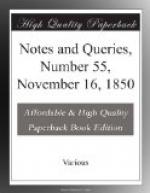“Classification,
1802.
3rd Epoch. Henry VIII. Gelegenheitsgedicht.
Classification,
1819.
3rd Epoch. Henry VIII., a sort of
historical masque, or show-play.”
“It (the historical drama) must likewise be poetical; that only, I mean, must be taken which is the permanent in our nature, which is common, and therefore deeply interesting to all ages.”—Lit. Rem., vol. ii. p.160.
What is said in this last extract might be applied (as Coleridge, I feel no doubt, had he gone one step farther into the subject, would have applied it) to the Shakspearian drama generally; and tried by this test Henry VIII. must certainly be found wanting.
Before I conclude I am anxious to make an observation with regard to the extract from Mr. Emerson’s Representative Men (vol. ii. p. 307.). The essay from which this is taken, I presume to be the same, in a printed form, as a lecture which I heard that gentleman deliver. With abundant powers to form a judgment for himself, I should say that his mind had never been directed to questions of this nature. Accident, perhaps, had drawn his attention to the style of Henry VIII.; but, with reference to the general subject, he had received implicitly and unquestioned the conclusions of authorities who have represented Shakspeare as the greatest borrower, plagiarist, and imitator that all time has brought forth. This, however, did not shake his faith in the poet’s greatness; and to reconcile what to some would appear contradictory positions, he proposes the fact, I might say the truism, that the greatest man is not the most original, but the “most indebted” man. This, in the sense in which it is true, is saying no more than that the educated man is better than the savage; but, in the apologetic sense intended, it is equivalent to affirming that the greatest thief is the most respectable man. Confident in this morality, he assumes a previous play to Shakspeare’s; but it appears to me that he relies too much upon the “cadence” of the lines: otherwise I could not account for his selecting as an “autograph” a scene that, to my mind, bears “unmistakeable traits” of Fletcher’s hand, and that, by whomsoever written, is about the weakest in the whole play.
It is a branch of the subject which I have not yet fully considered; but MR. SPEDDING will observe that the view I take does not interfere with the supposition that Fletcher revised the play, {403} with additions for its revival in 1613; a task for the performance of which he would probably have the consent of his early master.
SAMUEL HICKSON.
* * * * *
ON AUTHORS AND BOOKS, NO. IX.
Eustache Deschamps. Except in the two centuries next after the conquest, contemporaneous French notices of early English writers seem to be of rather infrequent occurrence.




